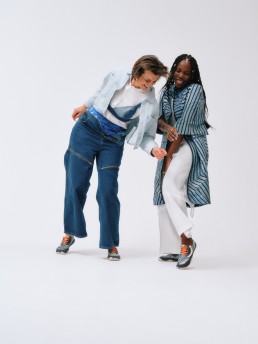ONU: Collaboration as a shared renaissance
The collaboration between Wildling and NKWO, curated by me, goes back to an encounter at the Fashion Changers conference in 2021. During the conference I met Christina, Lead Brand Interaction at Wildling. It quickly became clear to me that a cooperation between NKWO and Wildling would be a perfect match, because it is about establishing and also living out new values in fashion, as well as creating new connections.
This cooperation is special from two points of view: On the one hand, it is the first cooperation between a German sustainable label and a designer of African origin. On the other hand, this cooperation offers a stage to tell the story of sustainability from an African-Afro-diasporic perspective. Wildling’s philosophy – “We are Part of the Re:generation” – complements terms like Re-imagine, Re-think, Re-define and Re-connect, which Fashion Africa Now embodies.
The cooperation has created a new interplay that is about more than just producing shoes with a designer of African origin. It is about communicating unheard, marginalised content through new narratives and giving space to narratives around fashion from Africa and the diaspora.
We are creating a shoe that breaks stereotypes. With our ONU model, we create space for new impulses and dialogues about African fashion. “Onu” is a word of the Igbo people and means “together” in the Nigerian Igbo language. The aim of the cooperation is to intensify education, raise awareness and change perspectives in the sustainability industry. To initiate a dialogue about re-define fashion, more visibility for African fashion, as well as for networks that rethink and critically question fashion.

Sustainability and African Fashion
The origin of this capitalist system is racism, or the exploitation and colonisation of indigenous peoples and African countries. BIPoC (Black Indigenous People of Colour) cultures had already implemented a sustainable way of life in harmony with nature before it became a “trend” in Western countries. The need for sustainability today exists only because of the exploitation and dispossession of countries in the Global South.
These power structures and racism still exist today and act as a “motor” for the fashion industry. The conditions are maintained by global politics and international trade agreements that prevent countries in the Global South from implementing their own models of production and growth.
Structural racism in fashion?
Structural racism is the result of historical and social processes that have been influenced by many factors. It cannot be traced back to a single person. Rather, it is a complex problem perpetuated by structural, institutional and individual factors.
Examples include historical events such as colonialism, slavery and labour exploitation, all of which have contributed to the oppression and disadvantage of certain groups of people based on their race. Today, there are still many systemic barriers that lead to people being discriminated against on the basis of race.
It is important that we work together as a society to combat structural racism and work towards a more just and inclusive future. Racism is a problem that exists in many areas of society. The fashion industry also often contributes to reinforcing and strengthening racist stereotypes and prejudices.
Our perspectives
NKWO is an artisanal brand at the forefront of the sustainable fashion movement in Nigeria, with conservation of natural resources and the environment as core values of the label. Guided by the PHILOSOPHY LESS IS MORE, limited edition and one-of-a-kind pieces are made with low impact textile waste, cutting table waste and locally grown natural fibres. The brand has invented a new African ethical waste fabric called DAKALA™️ Cloth, which is used for production.
Regeneration needs a functioning togetherness. Together with Partner:innen we want to create moments, spaces and platforms where we meet at eye level – to listen to each other, learn and almost more often unlearn. NKWO x Wildling curated by Beatrace Angut Lorika Oola stands for such togetherness. All the stories shared here, as well as the shoe model “ONU”, symbolise an invitation to all to actively shape this collaborative future.
From one idea, a visual business card for designers of African origin has emerged. Beatrace Angut Lorika Oola does pioneering work every day – whether as founder of the platform “Fashion Africa Now” or as interdisciplinary curator or consultant of her own creative agency APYA Productions. Her declared goal is to create a network for designers made in Africa, to promote inclusion and to raise awareness.


Decolonisation vs. Deconstruct Fashion
Decolonising fashion is a process of questioning the colonial practices, structures and narratives that have shaped the fashion industry. It is about examining how colonialism has influenced fashion, such as through the exploitation of resources, labour and cultural appropriation.
To decolonise fashion, power and control must be shifted away from dominant Western perspectives and practices, and the voices and experiences of marginalised communities, including Black, Indigenous and People of Colour, must be centred.

Read more on Fashion Africa Now.
Photo credit: Nti








